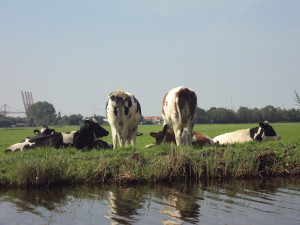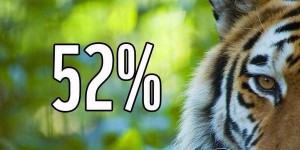Worldlog Semana 42 – 2014
La semana pasada terminó con una gran noticia para el grupo parlamentario del Partido por los Animales. El jueves por la tarde se hizo público que mi compañera Esther Ouwehand y yo estamos en el top 15 del Duurzame 100, la lista anual del periódico Trouw de las cien personas holandesas con mayor influencia en materia de sostenibilidad. Esther aparece en el puesto número 15, consiguiendo así el ascenso más rápido de toda la lista (el año pasado estaba en el puesto 85). Yo, por mi parte, el año pasado ocupaba el puesto numero 18, y ahora estoy en el 11.
Esperamos que el hecho de que nuestro grupo parlamentario al completo esté en el top 15 sirva de inspiración y estímulo a otros políticos. Me llena de orgullo ver que nuestro partido tiene un seguimiento tan amplio. Nuestra visión global para todo el planeta, sin dar prioridad a los intereses humanos a corto plazo, gana cada vez más terreno.
También cabe destacar que en la entrevista que concedí al periódico Trouw se mencionó de forma explícita mi blog internacional. Confío en que mi blog semanal contribuya a inspirar a ciudadanos de todo el mundo a esforzarse también por construir una sociedad sostenible.
Esther atrajo la atención del jurado gracias a su implacable lucha contra el uso de pesticidas en la industria agrícola. Plantando cara a agricultores y fabricantes de pesticidas, nuestra compañera creó un punto de información y denuncia del abuso de pesticidas: gifklikker.nl. Los fabricantes publican en la prensa anuncios a página entera quejándose del éxito de la lucha de Esther. Pero ella no se arredra 😉 A instancias de ella apareció el informe del Consejo de Salud Pública (Gezondheidsraad) sobre los peligros de los pesticidas. El Gobierno ha adoptado la mayoría de las recomendaciones del informe, por lo que pronto se van han a aprobar las primeras prohibiciones de sustancias peligrosas. Hasta el momento, la clase política venía restando importancia a los riesgos del uso de pesticidas en la industria agrícola. Pero ahora, gracias a la batalla presentada por Esther, la cuestión está de plena actualidad. ¡Enhorabuena, compañera!
Ya podemos afirmar que 2014 ha sido un año histórico para nuestro partido. Durante este ejercicio hemos realizado dos campañas electorales de gran éxito, con las que hemos doblado nuestro número de concejales y hemos obtenido por primera vez un escaño en el parlamento europeo. También hemos realizado una campaña junto con Pink!, la sección juvenil del partido, contra las malas políticas en materia de sostenibilidad del banco encargado de las finanzas del parlamento, el Royal Bank of Schotland. El resultado fue que la cámara adoptó una moción para cambiar de banco. ¡Orgullosa de nuestro partido!
La semana pasada hemos defendido con energía el derecho de las vacas a salir a pastar al prado. Nuestra intención es que el Gobierno rechace la propuesta de ley para el “crecimiento responsable de la ganadería láctea”, y adopte a cambio una ley que obligue a los ganaderos a que sus vacas salgan al prado. Porque es inaudito que el Gobierno califique de responsable un mayor crecimiento e industrialización de la ganadería. El sector ganadero holandés ya rebosa sus límites. Lo que necesitamos no es más crecimiento, sino todo lo contrario: hay que reducir el censo vacuno, dejar de crear megaestablos y aumentar el número de horas que las vacas salen al prado.
El sistema europeo de cuotas lácteas desaparece en abril de 2015. De esta forma, Europa elimina el único instrumento del que disponía para mantener el censo ganadero más o menos bajo control y limitar el crecimiento. Debido a esta propuesta de ley, la ganadería láctea se convertirá en una nueva forma de industria ecológica, lo cual supondrá un incremento del ya de por sí descomunal exceso de abono orgánico. Nosotros reclamamos una ley que apueste por un modelo territorial, con cultivo local del forraje y una producción de abono orgánico limitada a lo que cada territorio necesita.
La semana pasada presenté también una moción en el parlamento para prohibir, a partir de 2018, el sacrificio de pollitos de un día con la máquina trituradora. La votación es el 14 de octubre. Más información en el blog de la próxima semana.
Lee aquí (en inglés) la demoledora conclusión sobre el número de especies animales que ya hemos perdido en nuestro planeta: “We HAVEN’T lost 50% of our animals – the truth is MUCH worse!”
¡Que tengáis una buena semana!
Saludos,
Marianne
We, as the MPs of the Party for the Animals, had a great closure of the week. On Thursday evening it was announced that my colleague Esther Ouwehand and I are both in the top 15 of the Sustainable 100 of the Dutch daily newspaper Trouw. The Sustainable Top 100 is an annually recurring list of Dutch people who are influential in the area of sustainability. Esther ranks fifteenth and is the fastest climber in the list as a result (she ranked #85 last year). I ranked eighteenth last year, now eleventh.
We hope that other politicians will be inspired by the fact that our entire parliamentary group is in the top 15. I am proud that our Party has so many followers. Our Party’s planet-wide vision, where short-term human interests are not central, is gaining more and more ground.
I’m pleased to let you know that my Worldlog was specifically mentioned in the interview I had with the daily newspaper Trouw. I hope that my weekly blog contributes to inspire people world-wide to make an effort for a sustainable community.
Esther struck the jury because of her decisive fights against agricultural pesticides. She defied the powers of the farmers and pesticide producers and established a contact point: Gifklikker.nl. Pesticide producers are complaining about her successful fight in full-page advertisements in newspapers. It doesn’t bother her at all 😉 It was on her insistence that the report of the Health Council of the Netherlands on the dangers of agricultural pesticide was published. The government is largely accepting the recommendations, as a result of which the first dangerous pesticides will be banned. The risks of agricultural pesticides for humans and animals, which were minimised until recently, are in the spotlight now thanks to Esther’s fight. Congratulations Esther!
It can already be asserted that 2014 is going to be a historic year for our Party. We conducted two successful election campaigns, resulting in us doubling our number of municipal council seats and we achieved one seat in Europe. We also campaigned together with Pink!, the youth organisation of the Party, against the unsustainable policy of the house bank of the Dutch Lower House: the Royal Bank of Scotland. Following that, the Lower House adopted a motion to change its house bank. Proud of our Party!
Last week, we have stood up for cows to be allowed to graze outdoors. We want the government to withdraw the bill ‘Responsible Growth of the Dairy Farming Industry’ and to replace it by a statutory duty to enforce outdoor grazing for cows.
After all, it is outrageous that the Government believes that further growth and industrialisation of dairy farming can still be called a responsible action. The Dutch diary farming industry is already bursting at the seams. We don’t need growth but we need the livestock herd to be reduced. And there should not be more megastables but more outdoor grazing for animals.
The European milk quotas will expire by April 2015. By doing so, Europe is deleting the only instrument that it had to somewhat control the livestock herd and to restrict the increase in scale. The diary farming industry will become a new form of bioindustry thanks to this bill and the already enormous surplus of manure will grow even more. That is why we advocate a law that seeks for land-oriented dairy farming, growing food locally and where no more manure is produced than can be used locally.
I also submitted a motion in the Lower House last week to ban the culling of one-day-chicks by 2018. This will be voted on on the 14th of October. Read more about this in next week’s Worldlog.
Read here: the shocking conclusion about the number of animal species that we have already lost on earth: ‘We HAVEN’T lost 50% of our animals – the truth is MUCH worse!’
Have a great week! Greetings, Marianne


